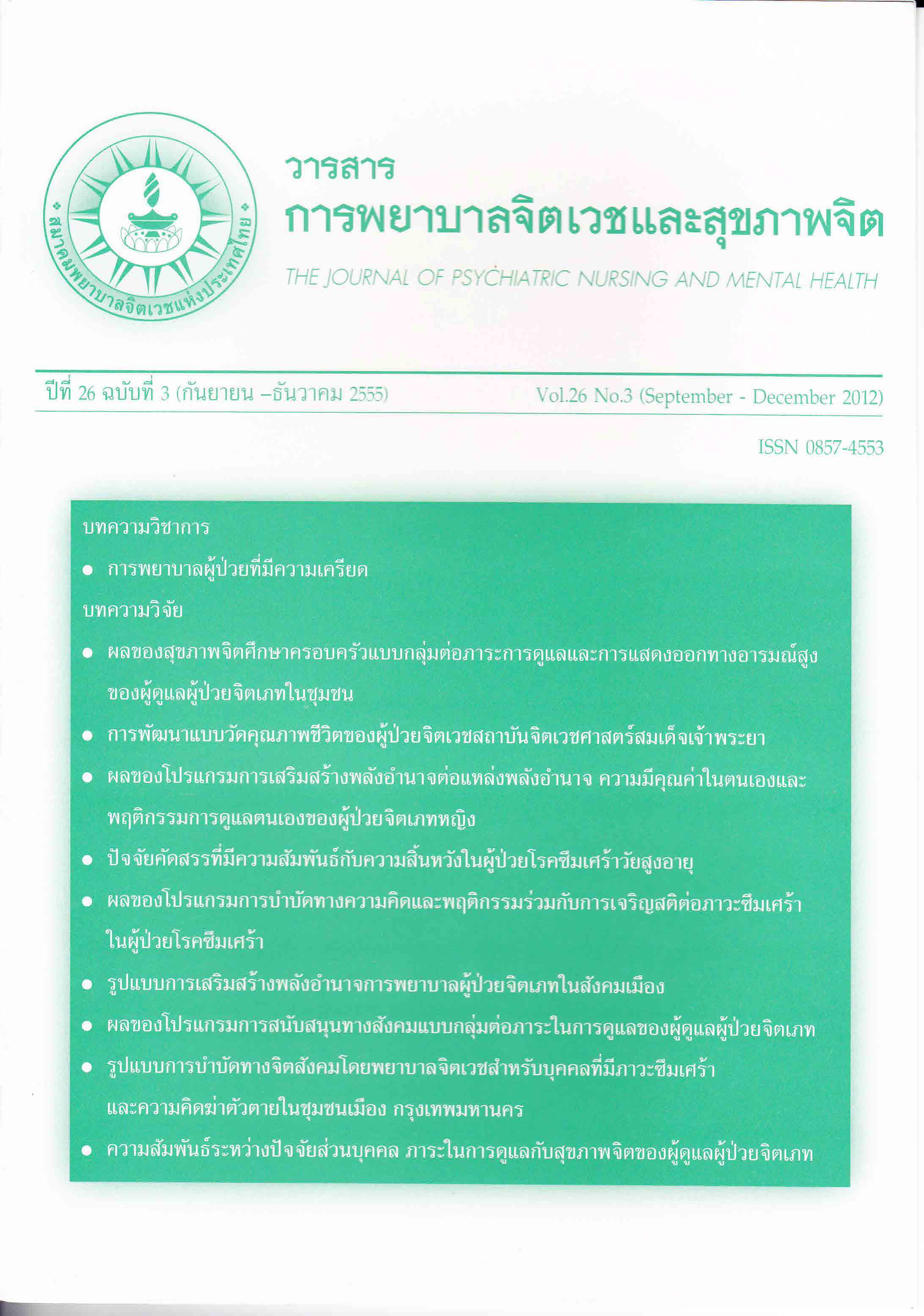รูปแบบการบำบัดทางจิตสังคมโดยพยาบาลจิตเวชสำหรับบุคคลที่มีภาวะซึมเศร้า และความคิดฆ่าตัวตาย ในชุมชนเมือง กรุงเทพมหานคร
Main Article Content
บทคัดย่อ
บทคัดย่อ
การวิจัยครั้งนี้ มีวัตถุประสงค์เพื่อพัฒนารูปแบบการบำบัดทางจิตสังคมโดยพยาบาลจิตเวชสำหรับผู้ที่มีภาวะซึมเศร้าและความคิดฆ่าตัวตายเปรียบเทียบภาวะซึมเศร้าและความคิดฆ่าตัวตายก่อนและหลังเข้าร่วมกลุ่มการบำบัดทางจิตสังคมและระหว่างกลุ่มทดลองและกลุ่มที่ได้รับการดูแลตามปกติ กลุ่มตัวอย่างเป็นผู้ป่วยที่มีภาวะซึมเศร้าที่มารับบริการ ณ หน่วยจิตเวชศาสตร์ โรงพยาบาลทั่วไปแห่งหนึ่งในเขตกรุงเทพมหานคร คัดเลือกโดยวิธีเจาะจงตามคุณสมบัติที่กำหนด เป็นผู้ป่วยนอกจำนวน 40 คน สุ่มเข้ากลุ่มทดลอง 20 กลุ่มควบคุม 20 โดยจับคู่ด้วย เพศ อายุ และระดับภาวะซึมเศร้า สำหรับผู้ป่วยในจำนวน 7 รายดำเนินการศึกษาเป็นรายกรณี โปรแกรมจิตบำบัดทางสังคมสร้างโดยคณะผู้วิจัย และได้ผ่านการตรวจสอบคุณภาพโดยผู้ทรงคุณวุฒิทางการพยาบาลสุขภาพจิตและจิตเวช 3 ท่าน ส่วนเครื่องมือที่ใช้ในการประเมินภาวะซึมเศร้าและความคิดฆ่าตัวตาย คือแบบประเมินภาวะซึมเศร้าและแบบประเมินความคิดฆ่าตัวตายของ Beck(ฉบับภาษาไทย) มีค่าความเที่ยงเท่ากับ .88 และ.81 ตามลำดับ ผลการวิจัยมีข้อสรุปดังนี้
1. รูปแบบการบำบัดทางจิตสังคมโดยพยาบาลจิตเวช ประกอบด้วย 6 ขั้นตอน คือ1) การสร้างสัมพันธภาพเพื่อการบำบัด 2) การให้คำปรึกษาเป็นกลุ่ม 3) ฝึกการคลายเครียดด้วยตนเอง 4) การให้ความรู้แบบประคับประคองด้านสุขภาพจิต 5) การปรับเปลียนความคิดและพฤติกรรม และ 6) ฝึกการปรับเปลี่ยนความคิดและพฤติกรรมทบทวน และสรุป
2. ภาวะซึมเศร้าและความคิดฆ่าตัวตายของกลุ่มที่ใช้รูปแบบการบำบัดทางจิตสังคมโดยพยาบาลจิตเวชภายหลังการทดลองลดลงกว่าก่อนการทดลองอย่างมีนัยสำคัญทางสถิติที่ .05
3. ภาวะซึมเศร้าและความคิดฆ่าตัวตายของกลุ่มทดลองที่ใช้รูปแบบการบำบัดทางจิตสังคมโดยพยาบาลจิตเวชลดลงกว่ากลุ่มที่ได้รับการดูแลตามปกติอย่างมีนัยสำคัญทางสถิติที่ .05
คำสำคัญ : ภาวะซึมเศร้า, ความคิดฆ่าตัวตาย, การบำบัดทางจิตสังคม, พยาบาลจิตเวช
Abstract
The objectives of this research were to develop the psychosocial intervention model by psychiatric nurses for person with depression and suicidal ideation, and to compare the depression and suicidal idea level before and after attending psychosocial intervention model, and between the experimental and control group. Samples were 40 depressed patients recruited from outpatient psychiatric unit of the general hospital in Bangkok Metropolis. Twenty patients were randomly assigned to the experimental group and the others were in the control group, which matched by gender, age, and level of depression, and seven in-patients case studies. The psychosocial intervention model were created by the researchers and were validated by three experts in psychiatric nursing. The reliability Beck Depression Inventary (Thai version) and Beck Suicidal Ideation Inventory (Thai version) two scales for evaluating depression and suicidal idea were .88 and .81 by Cronbach’s alpha coefficient. The major findings were as follows :-
1. The psychosocial intervention model by psychiatric nurses for person with depression and suicidal ideation compose of 6 stages:- 1) Therapeutic Relationship, 2) Group Counseling, 3) Relaxation Training, 4) Supportive Psychoeducation, 5) Cognitive Behavioral Restructuring and 6) Cognitive Behavioral Restructuring training, revision and summarization.
2. The depression and suicidal ideation of depressed person after participated in the psychosocial intervention model by psychiatric nurses were significantly lower than those before the experiment, at the .05 level.
3. The depression and suicidal ideation of depressed person who participated in the psychosocial intervention model by psychiatric nurses were significantly lower than those who participated the regular care, at the .05 level.
Keywords : depression, suicidal ideation, integrated psychosocial intervention
Article Details
บทความที่ได้รับการตีพิมพ์แล้ว เป็นลิขสิทธิ์ของสมาคมพยาบาลจิตเวชแห่งประเทศไทย


